Horses are the most important animal for the development of human society. Horses help people by work, transport, pleasure, and enjoyment. Horse feed is one of the vital parts of horse management. Good feeding practice for horses make them healthy and fit for work. Moreover, good feeding of horses will reduce the feed cost, less wastage, and keep your horse disease-free.
Managemental Tips on Feeding of Horses
The hoses stomach is simple, and it requires frequent feeding. The amount of feed must be less, and you must make a schedule for 24 hours. The digestive system of horses is different than many other animals. The enzymatic digestion takes part in the stomach, and microbial digestion of polysaccharides occurs in the cecum. So, you must be very cautious about the intensity and amount of horse feed. The good feeding practice for horse diet I will discuss in my article for your lovely animal.
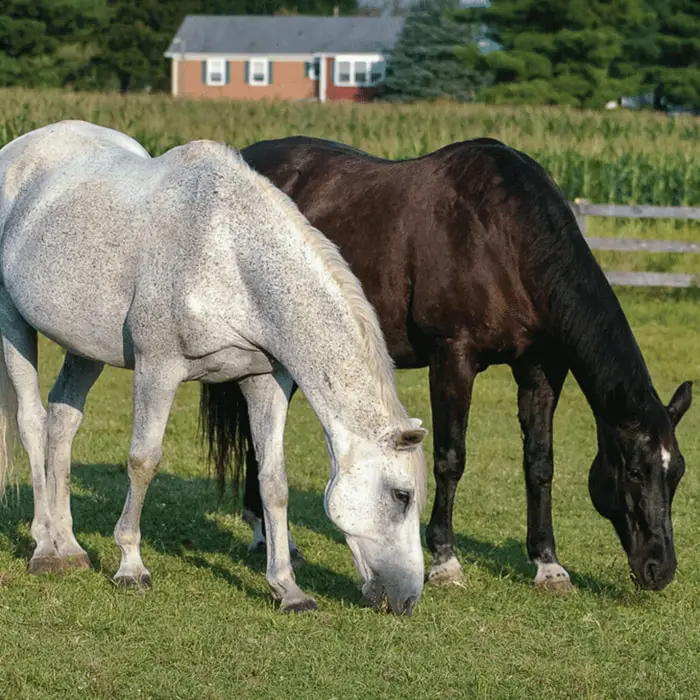
1. Feed Little and Often
The horse’s small gastrointestinal tract means that it must often eat and in small amounts. The working horse needs to be fed at least three times a day and would benefit from four feeds a day. When entirely hand feeding, give one-quarter of the concentrate at the morning and noon feeds, and the remaining half at night.
2. Good Feeding Practice: Feed Regularly
The feeding of a horse should be at the same time and in the same place every day. A horse is a creature of good habit and learns to expect food at a set time.
3. Make Ration Change Gradually
Especially in grain feeding, sudden feed changes can lead to a digestive disorder, colic, and diarrhea. A slow replacement over 7 to 10 days or longer is required, whether increasing the amount fed, changing from one grain to another, or just changing to grain from a new source.
4. Feeding of Horses: Weigh Feeds
Horses eat by weight, not by volume, so always weigh the amount of grain, hay, minerals, and supplements, because measuring feeds by volume can give a poor result. Remember that feeds from different sources have different densities. The diet’s proportion present as roughage must always be greater than the concentrate proportion (on a weight basis). Record quantities that are fed.
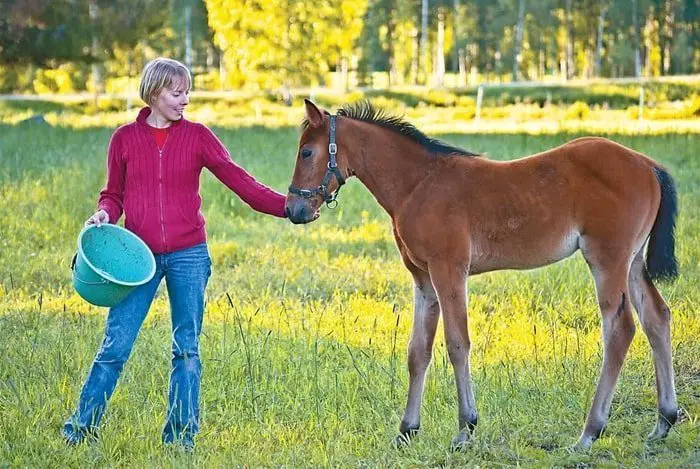
5. Feed Grains Other Than Oats In Mixture with Oats
Feed grains other than oats mixtures containing at least 50 percent oats. However, the replacement must be made on an equivalent basis. You can use the following guideline:
- 5Kg oats are equal to 4.2 kg barley or 3.5 kg maize or wheat.
While oats can be fed whole, all other grains should be coarsely crushed or rolled to improve digestibility. Boiling grain does not provide a significant nutritional advantage, but it does improve digestibility and palatability.
6. Check Contents of Commercial Mixture
Commercial mixtures of horse diet that contain grain, protein meals, minerals, and vitamins can be helpful as a supplement to available green grass and are often more convenient to feed than grain and high-protein concentrate mixed separately. The contents of prepared mixed feed must, by law, be listed on the container, but this list does not include the amount of energy. Be careful when low-feeding fiber feeds that you supply plenty of supplementary roughage and compare the protein and mineral contents of the feed you wish to use.
7. Mix Daily and Remove Leftover
Mix the horse feed in amounts sufficient for only one day’s feeding to prevent it from souring, turning rancid, or attracting flies. Clean any leftover horse ration out of the trough or bin before each feeding.
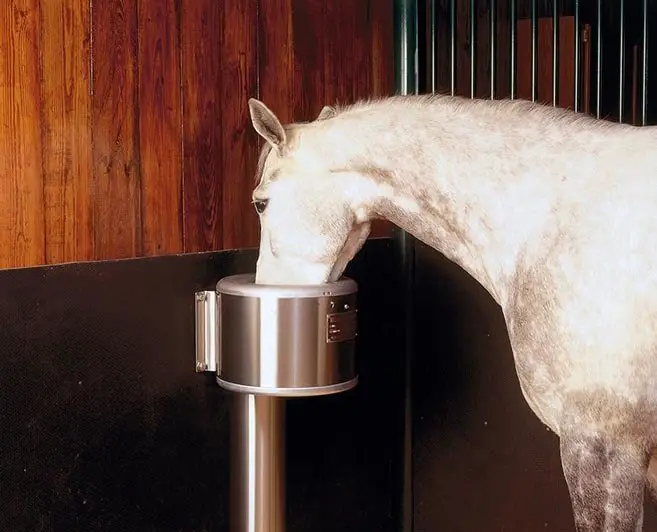
8. Don’t Use Poor Quality Feeds
Poor quality, unpalatable, dirty, or contaminated feeds can cause more problems than savings. They must not be used unless there are no alternatives. Never give moldy feed to horses because it can cause digestive disorders and possibly death.
The dusty feed should be avoided because the dust affects the horse’s respiratory system. If there is no alternative but to use dusty food, it should be dumped down before it is fed to the horse. The use of cheap feed generally uneconomical and buying good quality feed pays dividends in improved utilization.
9. Reduce Grain When Horses are Not Working
Working horses on high grain rations should be fed 50 t0 70 percent less grain when they are not being worked. Failure to cut rations can cause disorders such as “tying up” or laminitis, which can be fatal.
10. Give Horses Plenty of Exercises
Avoid enclosing horses in restrictive stables or yards for long periods unless regular exercise is given. The exercise period should be planned to coincide with times of minimal food intake. Do not work the horse until at least 2 hours after its last feed.
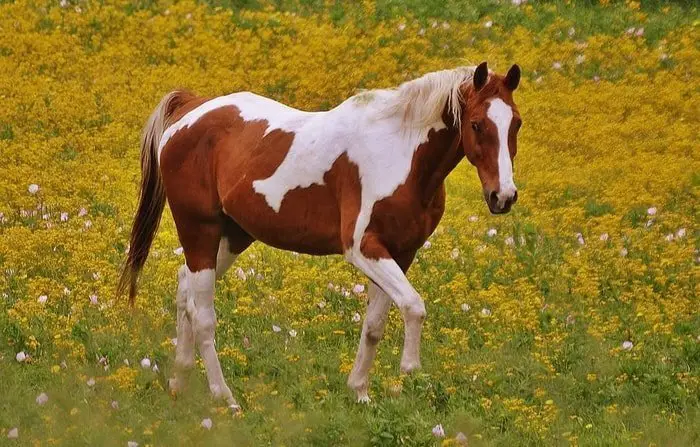
11. Always Have Clean Fresh Water Available
Clean freshwater which is free of organic matter and sediment should be available to horses at all times. A horse can take up to 70 liters of water a day. After heavy work, water should be limited to between 2 and 4 liters, given over 15-30 minutes, until the horse has thoroughly cooled down—place water on the opposite side of the stable to the feed trough. Horses tend to splash water when they drink, which can wet the feed and make it messy.
12. Check Horse’s Teeth Regularly
Regular inspection of teeth and rasping of molars is often necessary to prevent sore gums and feeding and digestive problems.
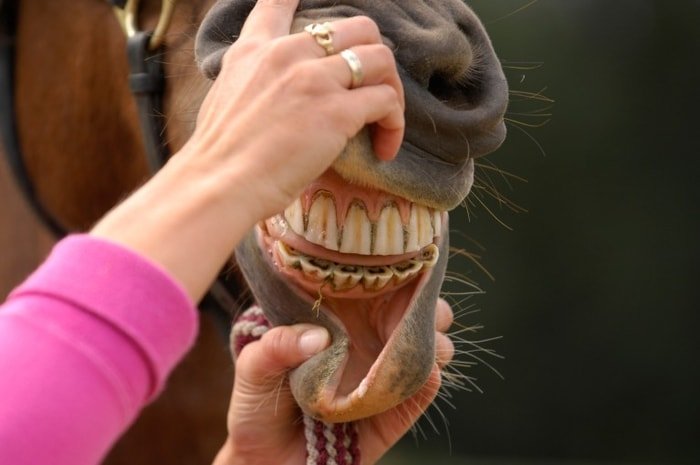
13. Feeding of Horses: Control Parasites
A regular manure removal and drenching program is required to minimize worm buildup. You must provide broad-spectrum anthelmintics for your horse at at least 3 months intervals. It is better to change the anthelmintics alternatively.
14. Feeding of Horses: Provide Shelter
In cold or hot weather, the provision of Shelter’s form can reduce stress and the amount of feed needed to maintain body weight.
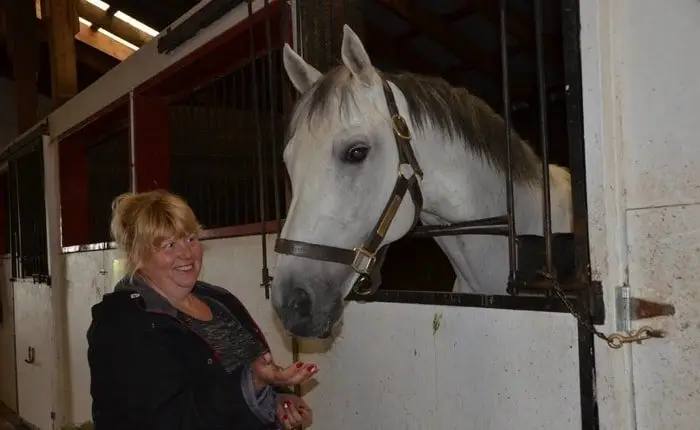
15. Provide Adequate Roughage
Horses evolved on a roughage-based diet, and they function best if they have plenty of hay or chaff when pasture is restricted. This aids digestion, satisfies hunger, and decreases wood chewing. Roughage contains fiber, which keeps horses warm in winter and minimizes behavioral problems during feeding.
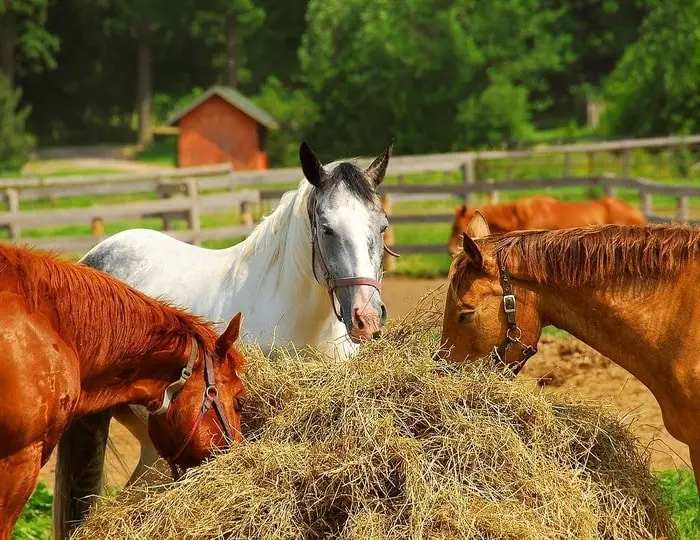
16. Feed According to Body Conditions
Use condition scoring or measure weight to assess the adequacy of feed quantities and the diet’s energy supply. Record condition scores or weights for later comparison and increase supplementary feed amounts before horses lose much body conditions or weight.
17. Feeding of Horses: Watch Pecking Order Effects
When feeding groups of horses, watch that the bossy horses don’t dominate the feed supply. Spread feed bins out and place one or two extra feed bins in each paddock. Segregate horses on age, type, and body conditions. This will minimize pecking order effects and allow you to give special attention to those horses that require extra feed.
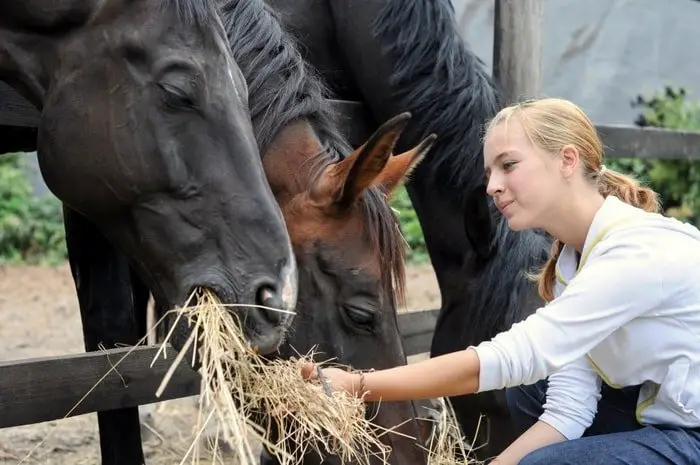
18. Use Feed Bins and Hay Racks
Use feed bins and waste racks will reduce wastage, feed contamination with soil, and worm infestation. In stables, racks can be placed over the feed bin to reduce wastage.
19. Feeding of Horses: Feed Simply
The horse evolves eating only one feed type-grass. Don’t introduce too much variety unless it is necessary to balance the diet. Use a minimum number of good quality feeds: this will help reduce feeding errors when other people are feeding for you.
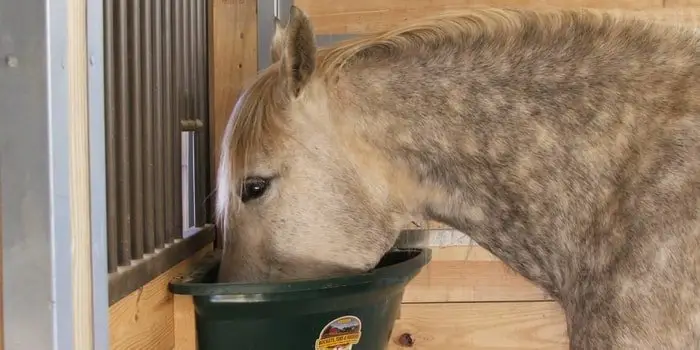
20. Prepare a Feeding Schedule for Horse
It would help if you prepared a daily routine of activities of 24 hours. The schedule includes the feeding time, watering time, exercise, grooming, changing of duties, bringing the horses outside and taking inside of stable, and cleaning time. The time of the daily activities may be different in summer and winter. So, you can make to schedule at a time on one display board. The schedule and routine must be displayed in such a place easily seen by all horse caregivers.
Final Advice on Feeding of Horses
Horse feed is one of the most important subjects that need careful preparation, supply, and management. Digestive disorders of horses mainly due to irregular feeding, unhealthy preparation, contamination, and inadequate feeding. An ideal feeding practice of horses will give you healthy and working fit animals.